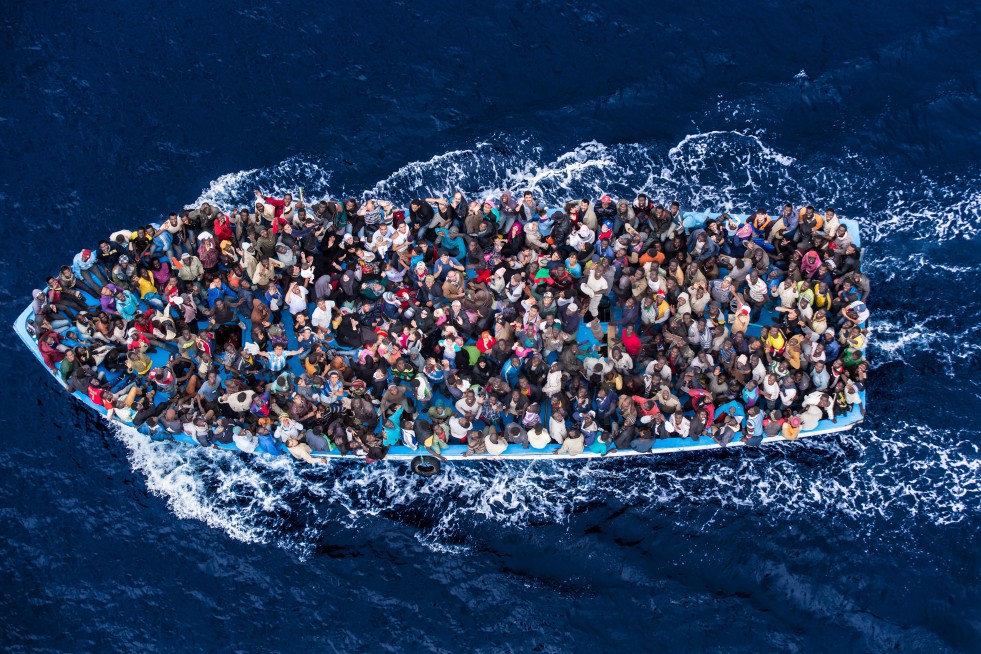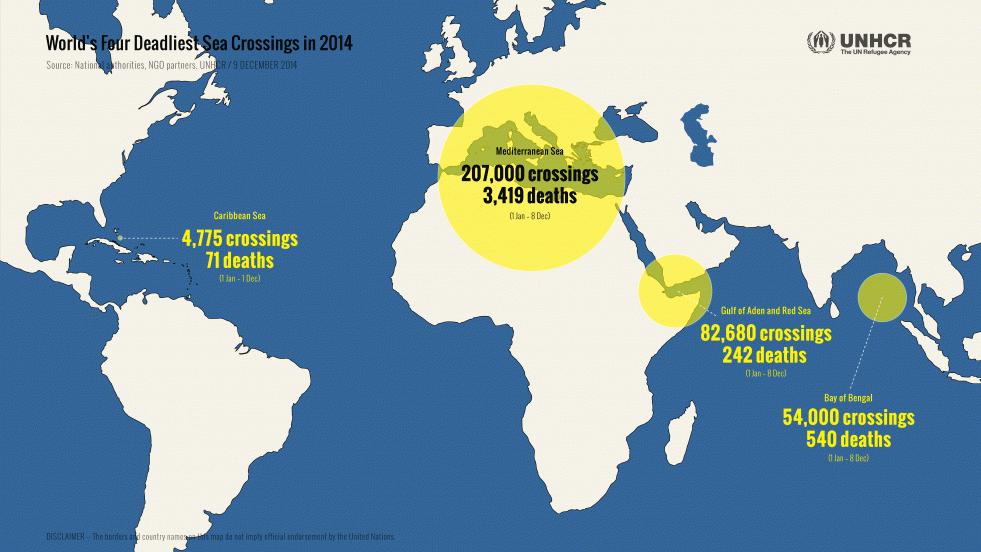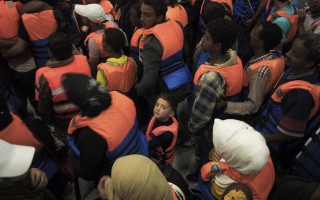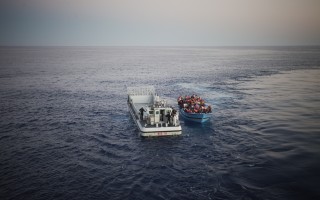Most refugees undertake a perilous journey to escape persecution, violence or death. But escape by sea is particularly dangerous as people confront unpredictable weather, unsafe and over-crowded vessels, unscrupulous human traffickers and smugglers. And even if they survive the journey, chances are they won’t receive a welcome reception in their country of refuge.
Alarmingly, as conflicts continue in Syria, Iraq, the Central African Republic, South Sudan and elsewhere, and with few opportunities to enter Europe by regular means, more and more people threatened by persecution and serious human rights violations at home are attempting to escape by sea to countries such as Italy and Greece.
UNHCR estimates that approximately 3,400 people have died or have gone missing at sea in 2014, approximately 2,800 since the beginning of July.
The ever increasing death toll in the Mediterranean Sea and the rising number of refugees and migrants risking their lives in rickety boats are a wake-up call for joint European action, based on solidarity, burden-sharing and protection of those fleeing persecution and violence.
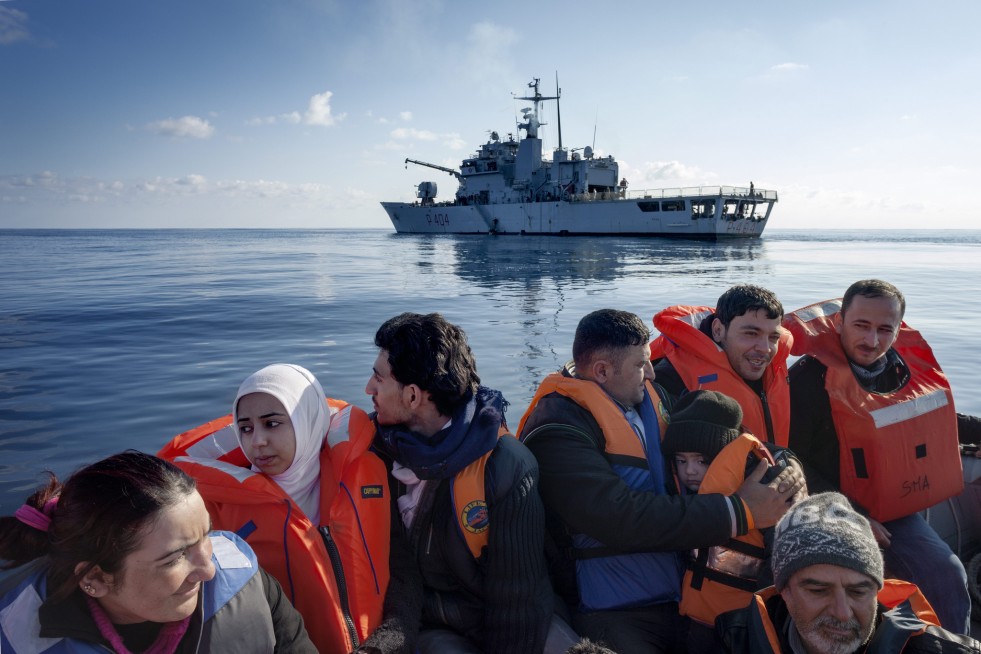
People who crossed the Mediterranean in 2014 came from more than 40 countries around the world on three different continents. © UNHCR/A. D’Amato
Where are people coming from?
People who crossed the Mediterranean in 2014 came from more than 40 countries around the world on three different continents. In the last two years, almost half of the arrivals in the Mediterranean were people coming from Syria and Eritrea, as well as Somalia and Iraq.
From January to October 2014, more than 60,000 Syrians, including almost 10,000 children, arrived by sea. In the same period almost 35,000 Eritreans arrived by sea in the Mediterranean, including 3,380 unaccompanied children. Remaining nationalities included people from a number of African countries, Afghanistan, and an increasing number of Palestinians fleeing Syria and most recently from Gaza.
Survival and loss: A teen’s deadly voyage to Europe
Nineteen-year-old Doa al Zamel fled her home in Syria in the hope of finding safety and a better future; she ended up desperately fighting for her life in the Mediterranean Sea and losing her fiancé. She still relives the trauma of September 10, when an unidentified vessel rammed into the smuggler’s trawler that was carrying Doa and more than 500 other people, including many women and children. The vessel quickly sank off the East coast of Malta; there were just 11 survivors.
Four days after the trawler set sail, it was stopped by another boat. “The people on it asked us to stop. They threw pieces of metal and wood at us and swore at our captain,” recalled Doa. “Our boat refused to stop and they circled us and rammed us. They waited until we had sunk and they left.”
The trawler sank in minutes. “Some people grabbed ropes hanging from the ship’s masts to save themselves. Some were cut to pieces by the propeller when they fell into the water. Most drowned,” Doa said.
Doa found herself in the water with some 100 survivors. She grabbed an inflatable ring and looked around for her fiancé. She realized that he must have gone down with the boat. For three days, the survivors floated in the Mediterranean without food or drinking water and gradually they started to die.
People began to ask Doa to take care of their children. A man with his one-year-old granddaughter handed over the child. “Then a mother came with an 18-month-old baby girl and a six-year-old boy and asked me to take care of the baby and I kept it too. I watched the grandfather and the mother and her son die.”
Doa said the goal of saving the two babies increased her determination to survive. She was rescued by a Liberian-flagged vessel: “The one-year-old baby died just as we were about to be picked up” and taken to Crete island. The other child rallied and recovered.
John Psaropoulos in Athens, Greece contributed to this story.
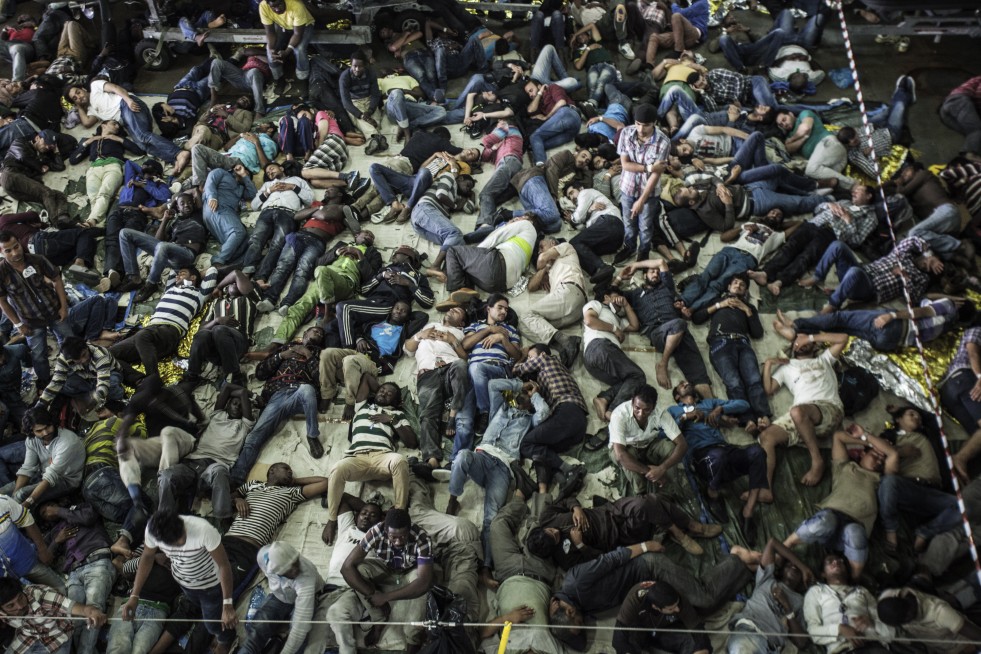
Single men sleep in a partitioned section of the San Giorgio military ship. On this particular night, 820 of them squeeze into this overcrowded area. Families and single women also have their own separate sleeping areas. © UNHCR/A. D’Amato
A search for family and safety in Europe
The fear of a grinding conflict in Syria that had already scattered his family across Europe left Ahmet* no choice. “I was born in Homs and I wanted to live here until the end,” the 55-year-old football coach says. “But this vicious war left us no other choice but to leave all behind.”
Ahmet and his wife, daughter and son sailed on a flimsy boat: “For the sake of my children’s future we had to take the risk.” Italy was the promised destination. From there, they would move on to Germany to unify with his brothers and two eldest sons. But smugglers abandoned the boat with 339 people off the coast of Cyprus.
Others without family members in other European countries were also adamant about making their way to Europe. So far, very few survivors have applied for asylum. Most of them are reluctant to do so out of fear that their application for asylum in Cyprus will remove their reunification prospects with family in other EU Member States. Others are concerned that by lodging an asylum claim they would be unable to bring their family members left behind in Syria because of the restrictive family reunification policies in Cyprus.



